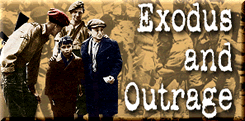A Para in Palestine
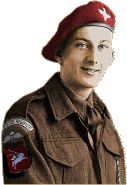 Ex Paratrooper Don Nicholls
Ex Paratrooper Don Nicholls late of the 7th LI Battalion
(1945 to 1948) reminisces
After being posted on call-up to a General Training Unit, where the government was trying to turn us into soldiers, they at least taught us the difference between our left and right feet. Numerous injections, vaccinations and the obligatory army hair cut followed, and we were finally let out to mingle with the long-suffering public.
After being told when to eat, the uniform to wear, when to get up, when to parade, and when to go to bed, my time there passed in a blur with not too much sinking in, including the passing of my 21st Birthday, which I remembered about three days after the event.
One day we were all mustered into a hut, and were addressed by PR representatives from the different services. One of which was a 'ten foot' soldier wearing a red beret, which had on it a Parachute Regiment badge. After the usual chit chat, he promised those of us who volunteered for the Parachute Regiment, that we would be turned into men nearly as good as he was. What man worth his salt could refuse such an offer, so I put my hand up and volunteered.
To ex Paras, what followed is well known to all and has been well covered by better writers than myself. Suffice it to say, after Hardwick, Ringway, and a two week hardening up course in the Brecon Beacons in Wales, we thought, no we knew that we could take on anything that was dished out to us, and be able to give a good account of ourselves.
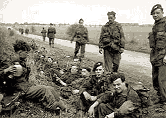
We, as a company of the 17th Battalion, paraded for the last time in Bulford Camp. We then went to Southampton and embarked on the SS Orontes. In the late afternoon our ship weighed anchor or what ever they do with it, and sailed down the Solent passing the two Cunard ships The Queen Mary, and the Princess Elizabeth, which were in dock together. A very rare occurrence so I was told.
Watching the lights on shore, and with the breeze on my face, I thought that when I get demobbed, I would join the Mercantile Navy as an electrician. What a life visiting exotic ports. By the morning, all the euphoria had gone and I was sick as the proverbial dog. This state of utter misery lasted for about four days. When I eventually came up for air, I thought it was not such a bad life after all.
Our first port of call was the Grand Harbour in Malta, and after a short while we set sail to arrive at Port Said, where we docked and prepared to disembark.
This was my first taste of the mysterious East, and because of the smell, I thought that you could have it. An officer, who politely told me that I was not on a Cook's Tour, overheard this remark I made to my mate. I could have told him that if I had been with a Cook's Tour, I would have had a decent cabin to pass the time in.

Our boat was surrounded by numerous small boats that were trying to sell the soldiers and other personnel on board souvenirs. If interest was shown, a line was thrown up and the goods were put in a basket, which was then hauled aboard.
After leaving the SS Orontes, which had been our home for the last two weeks or so, we left to take up residence in a tented transit camp that appeared to be run by German POWs.
Looking at these desert warriors of the late General Rommel, with their short shorts, wonderful suntan, and looking very fit, I looked at myself and my fellow comrades and saw knees that were in shades from a dead white to a bright red, clad in shorts that made it difficult to decide if they were long shorts or short longs. Garments, I believe, known as Bombay Bloomers.
We were approached by these gentlemen to buy some home made items made from wood etc. that could be purchased for cigarettes. Being assessed as not much good as customers, they left us in peace and got ready for the next influx of people.
Any reader will have to excuse my lack of memory for the big gap in my story, and I hope that there will be someone out there who will be able to fill in the gaps. However, to press on, I can remember arriving at a small town in the hills in the North East of Palestine called Safad. The town was well known as a place frequented by artists.
Our billet was a hotel that had metal ornamental grills to the windows making the place looking a bit like a prison. From the roof, however, one could see for miles in all directions, especially Mt. Hermon, which during my stay seemed to always have a snowcap on the summit.

Much to my disgust, I was made the Pay Corporal and was given an office below ground level. I have never liked working with figures and I suppose in the army's wisdom, if I had been an accountant, they would have made me a cook. Still, I believe I did the job well with no one being put into debt. I suppose I enjoyed it after a while. It certainly had its perks. When the NCOs wished to take leave, they always wanted a little extra cash, which I was able to obtain for them, legally, I hasten to assure the readers, and a few tins of cigarettes, that was an issue, changed hands. The worst part of the job was when NCOs left on leave as it left a shortage of persons to act as Guard Commanders. Being a one striper, I was placed on roster to do my bit but after the end of the guard the rest could take to their beds and I had to sit at my trestle table covered by an army blanket (my desk), and do the impress account for the CO. Before I could take my rest I had to have the pay roll ready for pay parade and make sure that the list of what and how much currency was needed, as the right pay had to be paid out to the soldier. Everyone can now put away the violins.
In hindsight, I know that I should have kept a diary of what we all got up to. Another of my duties was looking after the Major's dog and acting as a midwife when she decided to have a litter of puppies in my office. The Major went on a hunting trip somewhere, and brought back a baby leopard, which unfortunately took sick and died.
One of the more interesting jobs was to act, with another soldier, as shotgun guard to the Major when he paid a visit to a unit near us. This was during the night, and I swear that someone took a pot shot at us as we passed.
We were detailed to present ourselves at the cemetery to be on hand to quell any trouble when Dov Gruner, a member of the terrorist IZL Gang who had been hanged in Acre Prison, was buried. His sister had been flown from the USA, I believe, to attend the funeral and it was thought that there would be an uprising and acts of sabotage. Fortunately it passed off fairly peaceably. It seemed strange to me when the body arrived to see it transported in an army ration truck and not in a coffin.
Another event that was becoming the norm for the Paras and that was backing up the Palestinian Police or the Royal Navy when an illegal immigrant ship was brought into Haifa.
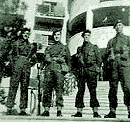
I was told by one of the Navy boarding party, that the conditions on board these rather small ships were indescribable. Some of the ships were ready for the scrap yard but in their desire to reach Palestine, the Jews were prepared to put up with anything. I was also told that in order to prevent the Navy from following them from the south of France ports, people on board were not allowed to throw any refuse or the like overboard and with men, women and children on board, one can imaging what the conditions would have been like.
One day I was detailed to take a jeep, driver and two men to go to a map reference and guard a small road bridge in preparation for the operation called Shark. The operations AGATHA & SHARK have been extremely well covered on the website 'Britain's Small Wars'. After the last truck of the convoy passed, we then had to tag along at the back. One could see the lights of the trucks in several convoys making their way by different routes to Tel Aviv.
After this exercise, I was shortly after given leave called LIAP, which in my case meant another boat trip before reaching the UK and re-uniting with my family after an absence of two years. I packed my kitbag and said farewell to sunny Palestine.
On reaching the UK and getting through customs without any problem, I arrived home into the bosom of my family. After a most enjoyable month's leave, a telegram from Home Defence arrived at the house to say that I had been re-mustered to Home Command and at the end of my leave to go to Aldershot. I did and was absorbed into the company's pay section there.
At Christmas some of us were asked to stay behind to man the fort so to speak over the Christmas and to go on leave after the holiday. After just having a four-week leave a short time before, I put my hand up. This proved to be a good move for on the return of the company, they and others had to do a drop to maintain their Para pay. So I missed out on that one. Being so close to demob, I would have liked to do one more jump but I did not relish having a broken leg or worse before getting out for good.
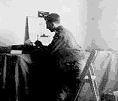
On my return in late January, I was sent on a demob course that meant going back to my old employer, as there were no other firms that were able to give the right type of work experience. So it meant another long stay at home. Having got the Royal Welsh Regiment, who did not want me around, to give me a sleeping out pass, I only had to present myself on paydays. Everything must come to an end and after going back for another short period, I was taken to Working. I went in one end a member of the Parachute Regiment and came out the other with a cardboard box that held a civvy suit and I was now entitled to be called Mister.
My time in the Paras was some of the happiest times of my life. I regret that my memory is not the best these days, so I do not remember many names. I did meet a Pte. Brown on a train coming back from a place called Barry Island, also in Cardiff and I literally bumped into a chap called Pte. Gethin who was appearing in the local drill hall, taking part in a wrestling match. The only other names that spring to mind are the company clerk L/Cpl. Bell (Tinker) and Cpl. Tandy. So my very sincere apologies to all the men I came in contact with and whose names I can't remember. I am quite sure that you would be recognised if I had the pleasure of meeting any of you again.
Don Nicholls Oct 2000

